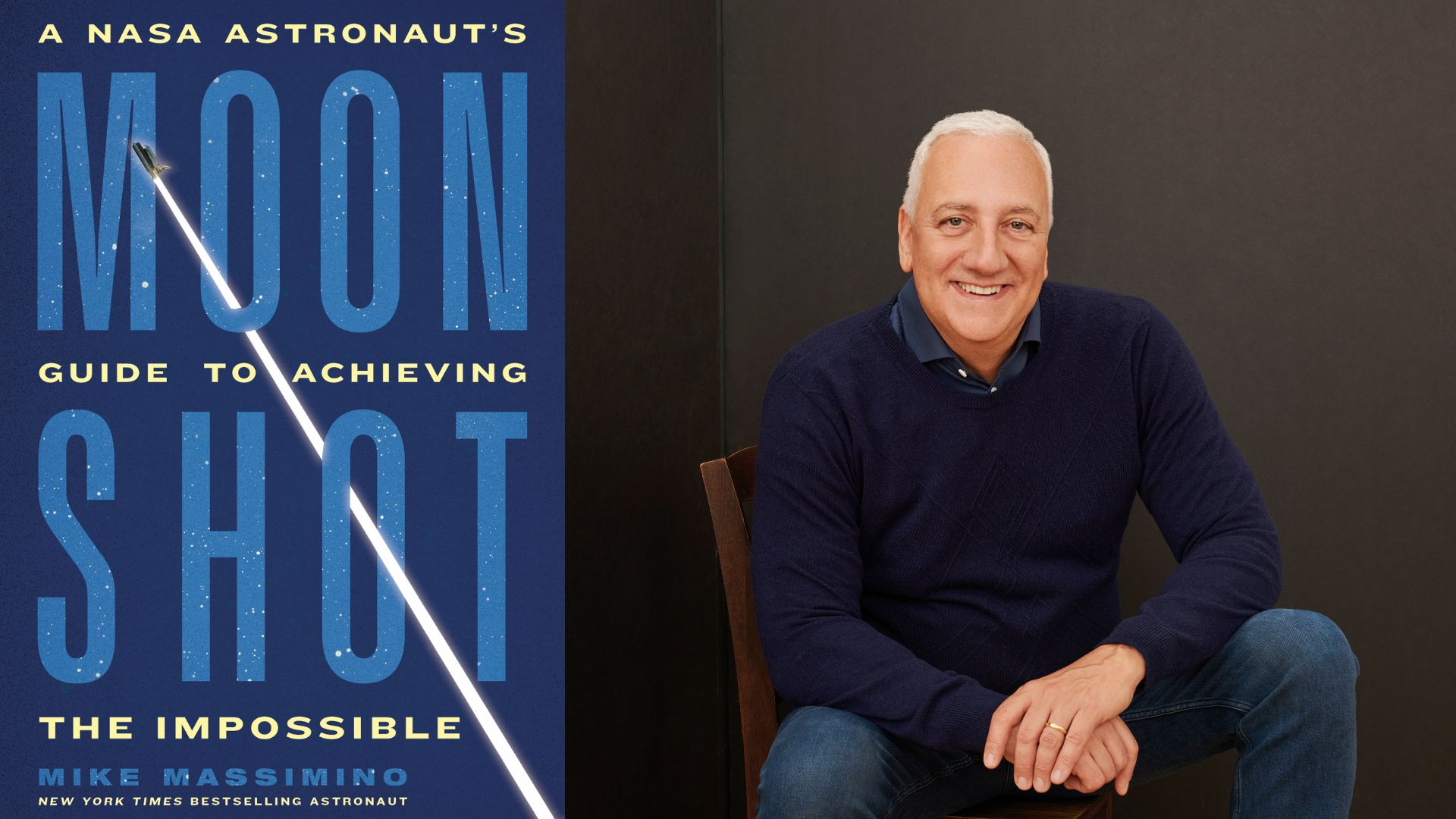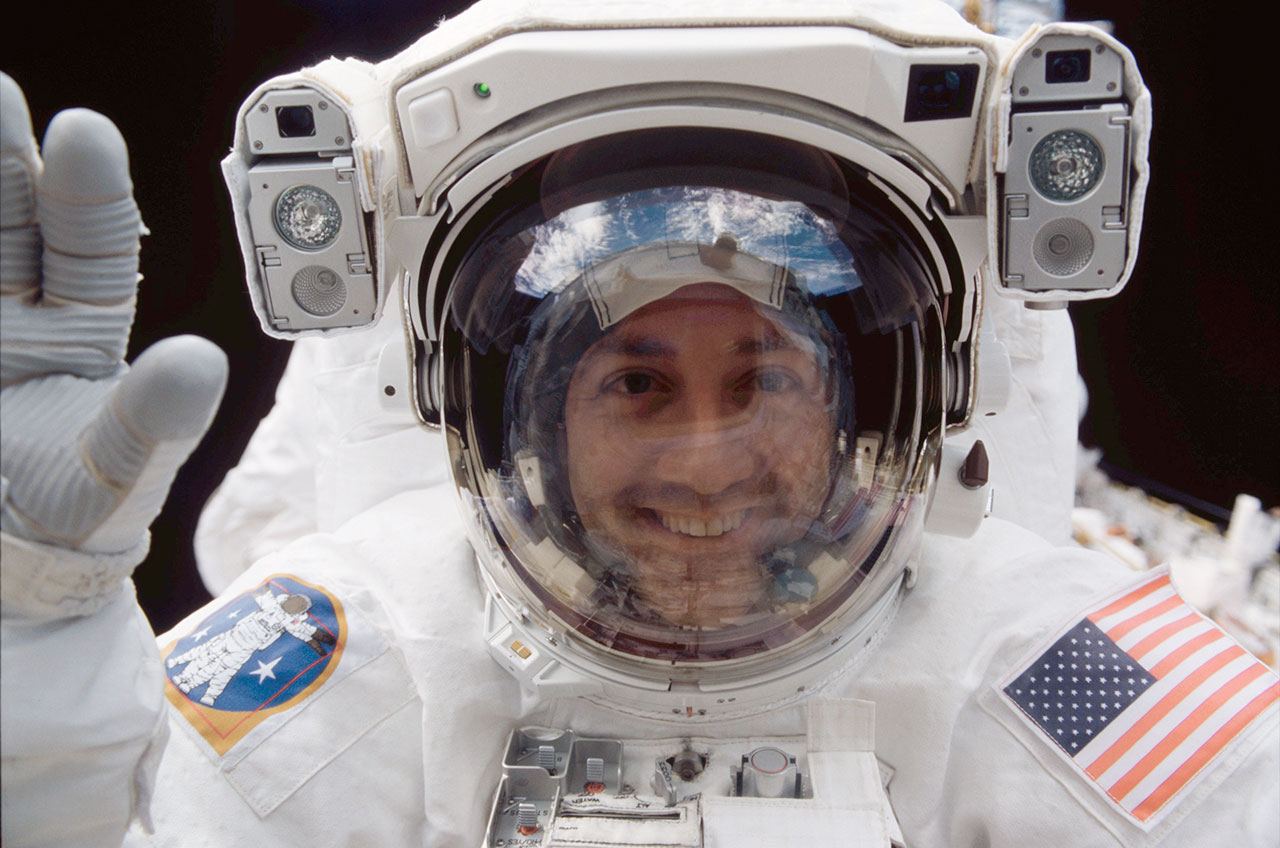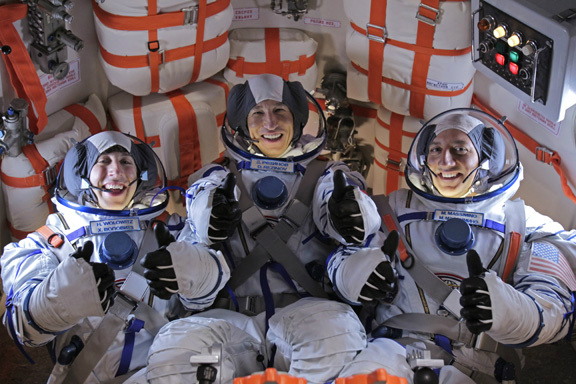
Former NASA astronaut Mike Massimino shares important life lessons from his journey to joining the space program and achieving what, at times, felt like an impossible dream.
Inspired by Neil Armstrong's first steps on the moon, Massimino dreamt of being an astronaut since he was six years old. Despite several setbacks, including poor eyesight and a fear of heights, he served as an astronaut from 1996 until 2014 and launched on two space shuttle missions to service the Hubble Space Telescope — the second of which was the final flight to upgrade the telescope in 2009.
"Moonshot: A NASA Astronaut's Guide to Achieving the Impossible" (Hachette Go, 2023), on sale starting Tuesday (Dec. 5), catalogs important lessons Massimino learned from his experiences in academia, training for (and being rejected by) NASA, and as a media personality — including a short stint on the the sitcom "The Big Bang Theory."
Related: How NASA's Apollo Missions Inspired This Astronaut to Aim for Space
Space.com sat down with Massimino to discuss the book, his advice for overcoming failure and his most memorable moment as an astronaut. Among his secrets to success are perseverance and teamwork, which he urges can be applied to pursuing any passion in life, whether that be on Earth or up in space.
This interview has been edited for clarity and length.
Space.com: This is your second book. What inspired you to tell this story and share the lessons you learned during your time at NASA?
Mike Massimino: My agent recommended I read Admiral McRaven's "Make Your Bed: Little Things That Can Change Your Life … And Maybe the World," which is about the lessons he learned as a Navy seal. Through the public speaking that I've done, I've found that the life lessons I've learned as an astronaut resonate most with audiences.
I mean, I am sure they think all the space stuff is cool — what it's like to launch, look [down] at the planet and do spacewalks — but the things that really seem to resonate with people are the lessons on persistence, teamwork, trust, knowing when to pivot or speak up, and how to deal with mistakes. So when I read McRaven's book, I thought there were things that I could share that would be helpful to people, and not only those who are interested in the space program — that was my inspiration to write the book.
Space.com: Feeling defeated is natural. How did you shift your perspective when faced with obstacles along your journey to become an astronaut; what kept you motivated?
Massimino: It was a deep desire to be a part of the space program. I dreamt about being an astronaut as a little boy after seeing Neil Armstrong walk on the moon. Once I had that dream — if I had the opportunity to be a NASA astronaut, I knew that would be my first choice. But if I couldn't do that, I knew I wanted to contribute in some other way, either as an engineer, working in operations or academia.
I was discouraged because I kept falling short and getting rejected, and the more I learned about [being an astronaut], the more I wanted it. I had to be honest with myself: I knew it was exactly what I wanted to do, but that it might not be possible. [The astronaut program] is really competitive and hard. Only a few people are picked out of thousands who are well-qualified. But I told myself, "I can't control that." What I could control was my willingness to try; doing my best and not giving up when I was told no.
Space.com: You were rejected by NASA three times before reaching your goal. Was it difficult to share with the world the challenges you faced?
Massimino: I think that if people are willing to listen to my story and they can get something out of it, then it makes it all worthwhile. When I was medically disqualified for my eyesight and I was trying to get that overturned, I remember thinking there was very little chance that I was going to be able to fix my eyesight — and even if I did, there was no guarantee that they would interview me again or ever pick me — but boy, wouldn't that be a great story!
When you're in pursuit of a dream, it adds more to the story and the gratitude that you have once you get there if you had to overcome obstacles. It just makes you appreciate the experience that much more. And, persevering to get to [my] goal was very helpful once I got to NASA because the challenges didn't stop.

Space.com: You knew you wanted to be an astronaut after seeing Neil Armstrong walk on the moon. What about that historic moment fueled your passion?
Massimino: Those astronauts were all my heroes. I wanted to grow up to be like them. The morning that we watched that launch I remember thinking, "This is the most important thing going on right now in the world. This is the most important thing that'll ever happen for the next 500 years." As a six-year-old, I thought that. We learn about stuff that happened 500 years ago, and this is what people 500 years from now are going to learn about. That feeling never left me. Even as I got older and the belief that I could become an astronaut went away, the interest and the belief in the importance of the space program never faded.
Space.com: Having been an astronaut, how would you describe the feeling of "achieving the impossible"?
Massimino: Overjoyed. Still in disbelief that it all happened. I remember describing to a friend of mine that it felt like my soul was alive. It went from a little boy's dream to something as I got older that I wanted to do as a career and dedicate my life to. It felt right, and I think that is because I had that passion. I had that interest, and that goes a long way.
When we were sworn in, Bob Cabana, who was the chief of the astronaut office, said something like, "We're all very happy that you're here today, but you need to remember that for every one of you there are thousands of people who are well-qualified that would do anything to switch with you today. You owe it to them to make the most of this opportunity. The only difference between you and them is that you are more fortunate than they are." And I felt very fortunate; very lucky to be given that opportunity.
Space.com: Humility, patience, determination, collaboration — all of these were key values woven throughout the lessons of your book. How do they help a person, or a team, succeed?
Massimino: All of these things are helpful both for individual success and for a team's success. At NASA, you were judged on how the team did. If you were good at something, your job was to help others who might need help. If you weren't — if you were struggling or you had an injury — you needed to admit that and get help. I think one of the most important things to be successful is to have a culture where people can improve, and humility allows you to improve and take help when you need it. There's no shame in needing help.
Patience is important because things don't always happen right away. Pursuing my astronaut dream was over 10 years in the making until I got picked and then it was another six years until I flew in space. I think you have to understand things — particularly things that are significant — don't necessarily happen right away. Then, determination and perseverance is really important because the road is going to be tough. You're going to get hit with obstacles.
A common trait that successful people have is not that they never failed, but that they never let failure stop them. By definition, if you're trying to do something difficult, it's not going to be easy — even if you're really good at whatever it is you do. There are going to be all kinds of obstacles that show up and you have to figure out a way around them.
Collaboration, I think, is so important because it takes some of the pressure off of the individual. You have a team around you and together you guys are stronger than you are individually. When there's a mistake, you stick together. You make mistakes as a team and you succeed as a team. I think that's the only way you can truly have a successful organization.

Space.com: How do the lessons of your book apply to people seeking a career in space, or who want to go to space?
Massimino: I think the lessons I learned apply to anybody wanting to do anything. Working in the space program, for example, I think teamwork is especially important … trusting in your teammates, trusting yourself, trusting your training. Knowing when to speak up because sometimes it is the new person who has a fresh perspective or idea, and people should be able to speak up without being told to be quiet. I talk about that [in the book] when there was a time that I did not raise a concern and I learned that it's better to speak up and be wrong than to stay silent and have something bad happen.
And, if you're on the management side, you want to listen. Hopefully ["Moonshot"] is a guidebook to help people who want to join the space program but also anyone — whatever it is that you want to be — I think that all of the lessons still apply.
Space.com: What about the Artemis program? How might the lessons of your book help NASA reach their goals to return to the moon and eventually land humans on Mars?
Massimino: As far as NASA, I think that teamwork and knowing when to pivot is really important. NASA did a really good job of starting the commercial crew program, understanding that it would be good to help private companies develop the capability to launch and that that would help the economy, but also help NASA and its pursuits. They're embarking on Artemis and then hopefully going to Mars, and that's not going to be easy. So, persistence and teamwork is going to be important, but also knowing that if one path isn't working, try another and pivot when necessary.
Space.com: One in a million is not zero — there is always a chance. What would you say to someone who is struggling to get their (moon)shot?
Massimino: I would say, keep trying. In my case, I felt that if I never became an astronaut, I could still have a happy life, but I wanted to at least keep trying. In the pursuit of a dream, it might not happen right away — it might not happen at all — but as long as you're working toward that goal, I think you're setting yourself up for happiness, even if that goal is never attained because at least you can say that you gave it your best shot and kept trying so you don't have regret.
Space.com: If becoming an astronaut hadn't worked out, what do you think you would have done with your career?
Massimino: I felt like teaching suited me and it gave me a chance to do research and help young people and still contribute to the space program. So, I think that's what I would have done. But who knows? That's the other thing about having a goal … it can lead to other things.
Space.com: You shared many of your experiences throughout the book. If you had to choose only one, what was the most impactful, or memorable, part of your astronaut career journey and why?
Massimino: I think the most important, impactful and special to me was being part of the final mission to service the Hubble Space Telescope. I felt that what we were doing was really special and I was very fortunate to be a part of it. When I think about my time — when I dream at night or when I think about my best memories — it's not necessarily being in space.
When I first left NASA, I dreamt of being in space again, one more time. Now I dream about working with the engineers and the instructors and the rest of my crew; figuring out things at the Goddard Space Flight Center in the clean room or working with the mission control team. That really was, for me, the highlight: Planning and executing my second mission in space.
"Moonshot: A NASA Astronaut's Guide to Achieving the Impossible" goes on sale starting Tuesday (Dec. 5)







